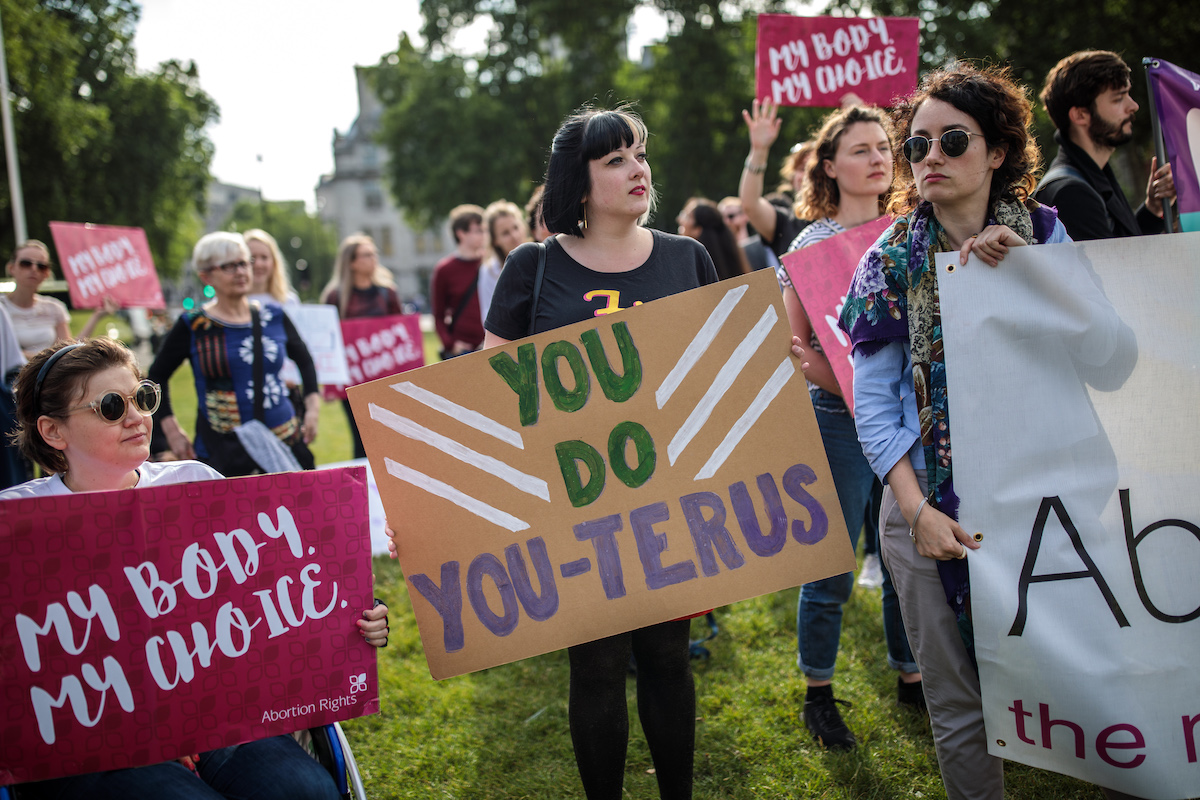Welcome to The Week in Reproductive Justice, a weekly recap of all news related to the hot-button issue of what lawmakers are allowing women to do with their bodies!
One week after an Alabama judge accepted a lawsuit that regarded an aborted fetus as a person, several states this week either advanced or passed dangerous anti-abortion laws.
In Ohio, the state Senate passed SB 23 to ban abortions at or after the moment a fetal heartbeat develops, sending the bill back to the state House, with Gov. Mike DeWine already confirming he would sign the bill into law. Ohio was joined by Kentucky, which also passed a fetal heartbeat ban on Thursday, in addition to another discriminatory, racist bill that purports to prohibit abortion on the basis of the fetus’ race or sex.
Both bills are currently being challenged by the ACLU.
In Arkansas and Utah, legislatures of both states almost simultaneously passed bills that would ban abortions at or after 18 weeks, which is substantially prior to the typical point of fetal viability, and could also endanger or infringe on the autonomy of pregnant people struggling with extreme health circumstances.
In Kansas, state lawmakers passed a resolution condemning a new New York law protecting the right to later abortion care for “violating the fundamental principles and values of the state of Kansas and of this nation,” and lawmakers plan to send the resolution to New York Gov. Andrew Cuomo and the New York state legislature.
And in Georgia, lawmakers introduced HB 546, a bill that would criminalize abortion and jail abortion providers immediately if and when Roe v. Wade is overturned by the Supreme Court.
Each of these bills endangers the health, safety, and certainly the human rights of women and abortion providers, in a country that’s passed nearly 1,200 anti-abortion laws since Roe inn 1973, more than a third of which have been enacted in the last decade.
Despite the extreme nature of each of these bills, they’re hardly surprising in the context of an ongoing national trend of increasingly successful, increasingly dangerous anti-abortion legislation and rhetorical campaigns, and while state lawmakers and activists across the country are mobilizing and fighting back, if the events of this week have made anything clear, it’s that we’re fighting an increasingly high-stakes, uphill battle.
New research about abortion in Texas proves the paradox of restricting later abortions
From 2012 to 2014, following the passage of a Texas law responsible for shutting down more than half of the state’s abortion clinics, abortions performed later than 12 weeks gestation increased across the state. In recent years, Texas enacted a law effectively banning nearly all abortions in the second trimester by banning the dilation and evacuation procedure, before the law was overthrown by a judge.
Per the findings of the Texas Policy Evaluation Project report released this week, after the law was enacted, 14.5 percent of abortions were performed later than 12 weeks gestation, compared with 10.5 percent prior to the law.
Nationwide, the vast majority of abortions are performed in the first trimester of pregnancy, but laws that restrict access to abortion have become increasingly common and can often have the consequence of delaying, rather than preventing, pregnant people from accessing abortion. As a result, for all the anti-choice rhetoric, and entirely inaccurate, fear-mongering lore about how later abortion is infanticide, it should be no surprise that later abortion is often caused by anti-choice policies in the first place.
Nearly all anti-choice policies fail to achieve the movement’s stated goals. On top of increasing the likelihood of later abortion occurring, anti-choice policies often directly threaten women’s lives by yielding higher maternal death rates and helping the United States have the highest maternal death rate in the industrialized world.
Maine could expand abortion access for rural residents
This week, Maine Gov. Janet Mills introduced a bill to permit health care practitioners other than physicians to offer abortion care. If implemented, the bill could make abortion accessible to women who live in parts of the state that lack abortion providers.
A previous version of the bill has previously been introduced by Mills while she served as Maine’s attorney general, but the bill was rejected by the state’s Republican-controlled legislature and governor’s office. Now, in 2019, with the state government effectively flipped pro-choice and Democratic, there’s a good chance the bill could be successful.
While we encounter anti-abortion bills far more frequently than proactive, pro-choice bills like this, bills like Mills’ have become increasingly popular as a means to expand waning access to abortion across the country. That’s because the requirement in many states that abortion providers must be physicians has always been rooted in stigma and limiting abortion access by limiting who can offer abortion, rather than medical practicality and safety.
Abortion is a highly safe, often simple, and non-surgical health care service that many health care practitioners are more than qualified to offer. Bills like this one in Maine could make tremendous progress in expanding abortion access, and also destigmatizing abortion care.
Tune in next week to see what lawmakers will try next in their never-ending mission to derail reproductive justice!
(image: Jack Taylor/Getty Images)
Kylie Cheung writes about feminism and politics, with a focus on reproductive justice. Follow her on Twitter @kylietcheung, or learn more about her writing at www.kyliecheung.tumblr.com.
Want more stories like this? Become a subscriber and support the site!
—The Mary Sue has a strict comment policy that forbids, but is not limited to, personal insults toward anyone, hate speech, and trolling.—








